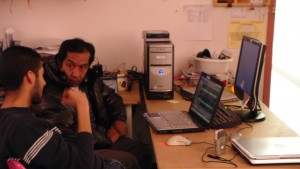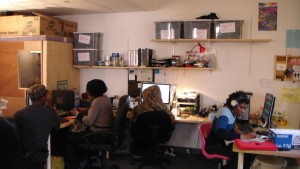 Why Interview? |
 Interview Types |
 Interview Tools |
 Interview Ethics |
 Test Your ‘IQ’ |
 Resources |
Confirming quotes
It’s a good idea to confirm quotes by checking with the interviewee before publishing the story to make sure they’re accurate.

A citizen journalist is trained to edit audio interview material with a People’s Production House program. Credit: Courtesy of People’s Production House.
Should you confirm quotes with your interviewees? Yes — run the quotes by your sources by phone or e-mail (many prefer phone because it discourages the interviewee from editing themselves after the fact vs. just affirming, “Yes, that is what I said.”)
Most people are delighted that you took the time to make sure a quote is correct.
Putting quote marks around a statement tells your readers that it is a verbatim statement. Use them around phrases or sentences that are exactly what the person said.
If you didn’t get the full quote, or if you can make someone’s point more succinctly yourself, then it’s OK to paraphrase. In that case, you don’t need the quote marks. But you do need to attribute the material.
Interview tip
When you’re interviewing someone, ask, “Do you mind if I call you back if I need to confirm something?” That way, you’ve set the stage to check quotes or other facts with them in a follow-up phone call or e-mail.
Example: The new skate park has been delayed? Without using quotes, you could say: Woodside Park president Joe Jones says the new park is most likely going to be delayed because the neighborhood association has decided it wants to see another set of plans. You don’t need quotes because Joe Jones did not utter these exact words; the sentence is paraphrased.
One surefire method: When talking to someone whom you are likely to use as a source, ask right then, “Do you mind if I call you back if I need to reconfirm something?” Or you can say, “I’d like to call you back to double-check that nothing has changed.” Again, most interviewees are happy to help you get it right. Make sure you get or confirm a cell phone number or e-mail address.
What might come up:
- If you have used an audio recorder at a community meeting and have thoroughly listened to the recording but are not sure about some words, call the speaker.
- If you listen and take good notes and are ready to write something for your blog, newsletter or other publication but want to be extra-certain, call or e-mail an excerpt of what you’re working on. Magazine fact checkers do this all the time. And good reporters make sure they confirm everything more than once with more than one source. But in general professional journalists don’t share their finished articles with sources ahead of time, even if the article is favorable.

Citizen journalists hone their editing skills as they transform interview material into audio stories for People’s Production House. Credit: Courtesy of People’s Production House.
The most important thing about quotes — besides accuracy — is that they capture people in their own words only when they say something powerful, witty or telling. You don’t need quotes around something mundane such as, “She said the meeting will be held next month at the usual place and time.”
Look for those gems of quotes that put things in a way no one else could — quotes that capture a speaker’s personality or passion. Remember Rep. Paul Brown’s (R-Ga.) statement that the economic bailout plan was “a huge cow patty with a piece of marshmallow in it”? That’s a good quote.
“That’s one of most exciting things about interviews,” says Kristofer Ríos of People’s Production House. The people you talk to, he says, “will put it in better ways than you can put it.”
